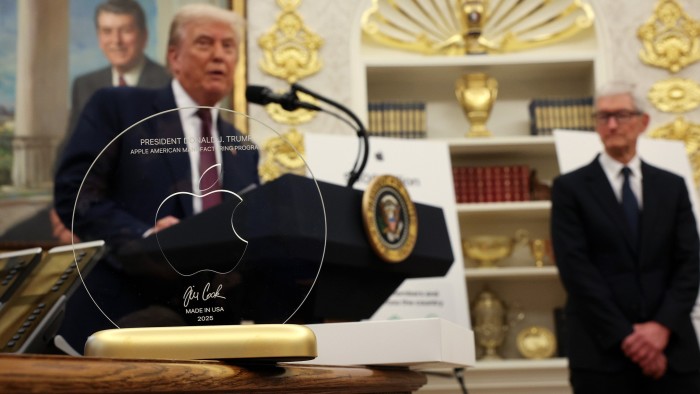Unlock the White House Watch newsletter for free
Your guide to what Trump’s second term means for Washington, business and the world
Donald Trump picks winners and losers in corporate America now. This opens up thrilling new opportunities for anyone who feels confident in predicting the president’s next steps and potentially alarming risks for everyone else.
The past couple of weeks have brought some extraordinary scenes. It becomes clearer every day that it is no longer left to the invisible hand of capitalism to figure out who will win in the money game. Instead, the Trump administration is setting entirely new rules, and is proud of it.
Last week it said it would grant newfangled export licences to chips monster Nvidia and to AMD, enabling them to send certain products to China. The government will get a 15 per cent cut of the revenues. Set aside for a moment the security concerns here. “What’s next — letting Lockheed Martin sell F-35s to China for a 15 per cent commission?” as one expert put it to us this week. Instead, focus on the seemingly unprecedented nature of these licence deals, and think about how the Trump administration might award them in future.
Treasury secretary Scott Bessent said he believes the arrangement is “unique” but that now it is lined up, “why not expand it?”
Meanwhile, in-your-face examples of companies currying favour with the big man are becoming commonplace. Earlier this month, Tim Cook of Apple presented Trump with what he described as a 24-carat gold block, about the size of two iPhones glued together — a mount for a glass disc engraved in dedication to the president. It was a special gift from a man whose company’s share price shed some $700bn in the aftermath of the president’s global trade tariffs announcement on April 2. Shortly after the presentation, Trump announced tough new tariffs on chip imports, but said Apple would be spared.
It is hardly new for presidential administrations to favour certain sectors. Joe Biden, for example, spearheaded vast governmental support for the green energy sector through the Inflation Reduction Act of 2022.
But this is different. It is personal, it is in full public view, and it is highly specific. And so far, it has worked out pretty well for companies in the sweet spot. AMD’s shares have gained almost 6 per cent in value since the China deal came to light. Apple is up by 13 per cent since Cook delivered his gift. Cryptocurrency-related stocks have all leapt since Trump came back to the White House, reflecting the enthusiasm that he and his sons demonstrate for the sector. For investors, some kind of insight into which other companies or sectors might get a thumbs-up in future would provide a real advantage.
The thumbs do not always point upwards, however. Witness the sorry tale of Tesla. Its shares have fallen by 17 per cent so far this year after chief executive Elon Musk had a bust-up with the president — who went on to remove much-needed subsidies for electric vehicles. Shares in Intel briefly dropped in early August after the president called for the resignation of its chief executive. More recently, they shot higher on signs that the Trump administration is considering the bracingly interventionist step of buying a stake in the company.
Taken together, this means money managers need to take the whims of the president much more seriously, whether they are stockpickers or index huggers, because of the enormous weight that big tech — the main target of Trump’s attention at this point — occupies in the main stocks indices. For now, the wind has blown in Nvidia’s favour, for example, but what if it were to change direction at some other point in Trump’s term? What if a smaller, less resilient company somehow attracted the ire of the president?
It is close to impossible to predict which companies will be winners and losers here but investors know they have no choice but to roll with it. “One thing that’s easy to predict is there’s going to be policy volatility and chaos across all sectors,” said Shep Perkins, chief investment officer at Putnam Investments. “President Trump likes deals.”
When looking for clues on how this might all pan out, it is useful to think of China, which has delivered numerous nasty regulatory surprises for investors in recent years. In 2021, for example, authorities in Beijing launched a crackdown on education companies. Investors had not seen this coming, and some directly affected stocks shed as much as 40 per cent in value in a day. A technology crackdown in the same year also hammered some individual China-related stocks, such as ride-hailer DiDi.
At the time, many global investors were looking at China as a potential winner from the waning Covid pandemic, figuring that the country was the first to suffer from the virus and would be the first to recover. But repeated, targeted policy shocks, with little predictable underpinning, led a lot of those investors to view its markets as uninvestable.
Clearly, the US is not at that point yet. But an increasingly assertive president, riding high on buoyant markets that are not pushing back against his capricious instincts, can easily make or break a stock picker’s year without warning.
katie.martin@ft.com

